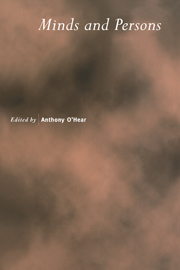Book contents
- Frontmatter
- Contents
- Preface
- Notes on Contributors
- Perceptual, Reflective and Affective Consciousness as Existence?
- The Domain of Folk Psychology
- Minds, Persons and the Unthinkable
- Moderately Massive Modularity
- A Theory of Phenomenal Concepts
- Free Will and the Burden of Proof
- Materialism and the First Person
- Language, Belief and Human Beings
- Human Minds
- Non-Personal Minds
- Personal Agency
- Mental Substances
- Mind and Illusion
- Index
Mind and Illusion
Published online by Cambridge University Press: 04 August 2010
- Frontmatter
- Contents
- Preface
- Notes on Contributors
- Perceptual, Reflective and Affective Consciousness as Existence?
- The Domain of Folk Psychology
- Minds, Persons and the Unthinkable
- Moderately Massive Modularity
- A Theory of Phenomenal Concepts
- Free Will and the Burden of Proof
- Materialism and the First Person
- Language, Belief and Human Beings
- Human Minds
- Non-Personal Minds
- Personal Agency
- Mental Substances
- Mind and Illusion
- Index
Summary
Much of the contemporary debate in the philosophy of mind is concerned with the clash between certain strongly held intuitions and what science tells us about the mind and its relation to the world. What science tells us about the mind points strongly towards some version or other of physicalism. The intuitions, in one way or another, suggest that there is something seriously incomplete about any purely physical story about the mind.
For our purposes here, we can be vague about the detail and think broadly of physicalism as the view that the mind is a purely physical part of a purely physical world. Exactly how to delineate the physical will not be crucial: anything of a kind that plays a central role in physics, chemistry, biology, neuroscience and the like, along with the a priori associated functional and relational properties count as far as we are concerned.
Most contemporary philosophers given a choice between going with science and going with intuitions, go with science. Although I once dissented from the majority, I have capitulated and now see the interesting issue as being where the arguments from the intuitions against physicalism—the arguments that seem so compelling—go wrong. For some time, I have thought that the case for physicalism is sufficiently strong that we can be confident that the arguments from the intuitions go wrong somewhere, but where is somewhere?
- Type
- Chapter
- Information
- Minds and Persons , pp. 251 - 272Publisher: Cambridge University PressPrint publication year: 2003
- 43
- Cited by



